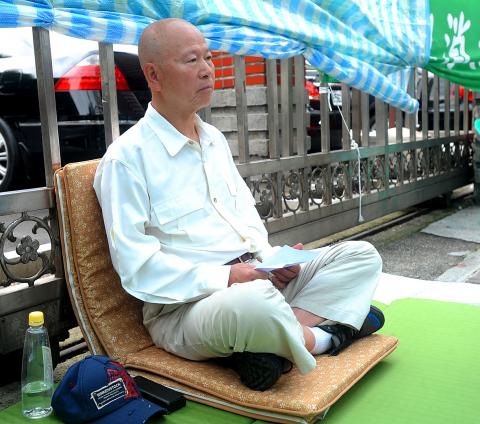Former Democratic Progressive Party (DPP) chairperson Hsu Hsin-liang (許信良) yesterday finished the first day of his hunger strike in front of the legislature after receiving no response from President Ma Ying-jeou (馬英九) to three demands he made on Sunday.
The 70-year-old Hsu said he would not back down until Ma concedes.
After beginning a sit-in on Sunday afternoon, Hsu gave Ma 24 hours to respond affirmatively on three issues — freezing fuel and electricity prices, retaining the ban on beef imports containing residues of the feed-additive ractopamine and giving a presidential pardon to former president Chen Shui-bian (陳水扁), who is serving a 17-and-a-half-year prison sentence for corruption.

Photo: Lin Cheng-kung, Taipei Times
Hsu vowed to stage an indefinite hunger strike if Ma failed to give “positive responses.”
Presidential spokesperson Fang Chiang Tai-chi (范姜泰基) said on Sunday night that Ma “had already made necessary adjustments to his policies” and urged Hsu to take care of his health.
Yesterday afternoon, Hsu said he still hoped Ma would agree to all three demands, adding that he would find it acceptable “if Ma offered concessions and agreed to negotiate the three issues with the DPP.”
On the issue of a presidential pardon, Hsu said it was an exclusive constitutional right of the president and a “higher power” than the judiciary.
“There is no such thing as interference with the judiciary, because it [a presidential pardon] is made out of political deliberation rather than legal consideration, with the president making his own judgement on the basis of the national interest,” Hsu said.
Hsu is one of five candidates for this weekend’s Democratic Progressive Party chairmanship election.

Japanese footwear brand Onitsuka Tiger today issued a public apology and said it has suspended an employee amid allegations that the staff member discriminated against a Vietnamese customer at its Taipei 101 store. Posting on the social media platform Threads yesterday, a user said that an employee at the store said that “those shoes are very expensive” when her friend, who is a migrant worker from Vietnam, asked for assistance. The employee then ignored her until she asked again, to which she replied: "We don't have a size 37." The post had amassed nearly 26,000 likes and 916 comments as of this

US President Donald Trump said "it’s up to" Chinese President Xi Jinping (習近平) what China does on Taiwan, but that he would be "very unhappy" with a change in the "status quo," the New York Times said in an interview published yesterday. Xi "considers it to be a part of China, and that’s up to him what he’s going to be doing," Trump told the newspaper on Wednesday. "But I’ve expressed to him that I would be very unhappy if he did that, and I don’t think he’ll do that," he added. "I hope he doesn’t do that." Trump made the comments in

Tourism in Kenting fell to a historic low for the second consecutive year last year, impacting hotels and other local businesses that rely on a steady stream of domestic tourists, the latest data showed. A total of 2.139 million tourists visited Kenting last year, down slightly from 2.14 million in 2024, the data showed. The number of tourists who visited the national park on the Hengchun Peninsula peaked in 2015 at 8.37 million people. That number has been below 2.2 million for two years, although there was a spike in October last year due to multiple long weekends. The occupancy rate for hotels

A cold surge advisory was today issued for 18 cities and counties across Taiwan, with temperatures of below 10°C forecast during the day and into tonight, the Central Weather Administration (CWA) said. New Taipei City, Taipei, Taoyuan and Hsinchu, Miaoli and Yilan counties are expected to experience sustained temperatures of 10°C or lower, the CWA said. Temperatures are likely to temporarily drop below 10°C in most other areas, except Taitung, Pingtung, Penghu and Lienchiang (Matsu) counties, CWA data showed. The cold weather is being caused by a strong continental cold air mass, combined with radiative cooling, a process in which heat escapes from